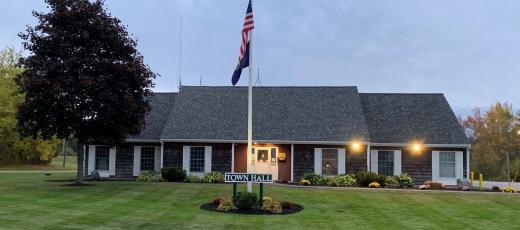MS-4 Stormwater Resources
TOWN OF GREENLAND: EPA MS4 “MUNICIPAL SEPARATE STORM SEWER SYSTEM” PERMIT INFORMATION PAGE
Polluted stormwater runoff is commonly transported through municipal separate storm sewer systems (MS4s), and then often discharged, untreated, into local water bodies.
An MS4 is a conveyance or system of conveyances that is:
- owned by a state, city, town, village, or other public entity that discharges to waters of the U.S.,
- designed or used to collect or convey stormwater (e.g., storm drains, pipes, ditches),
- not a combined sewer, and
- not part of a sewage treatment plant, or publicly owned treatment works (POTW).
To prevent harmful pollutants from being washed or dumped into MS4s, certain operators are required to obtain NPDES permits and develop stormwater management programs (SWMPs). The SWMP describes the stormwater control practices that will be implemented consistent with permit requirements to minimize the discharge of pollutants from the sewer system.
MS4 Annual Reports
Permit Year 1 MS4 Annual Report
Permit Year 2 MS4 Annual Report
Permit Year 3 MS4 Annual Report
Permit Year 4 MS4 Annual Report
Permit Year 5 MS4 Annual Report
MS4 Other Documents
MS4 Authorized Representative - 09.25.2023
SWPP Stormwater Pollution Prevention Plan
O&M Operations, Maintenance and Procedures
Greenland MS4 Impaired Waters Map
EPA MS4 Permit Authorization Letter - Received on March 18, 2019
Delegation of Authorized Representative to administer the MS4 Permit Program
MCM2 Public Involvement and Participation
- The Town’s Stormwater Management Program is provided for public review and comment every year.
- MCM3 Illicit Discharge Detection and Elimination (IDDE) Program (At their October 21, 2019 meeting, the Board of Selectmen adopted the IDDE Ordinance and Program which establishes the town’s authority to prohibit illicit discharges to their MS4 system.)
- Adopted IDDE Ordinance and Program (At their July 29, 2019 meeting the Board of Selectmen will consider adoption of the IDDE Administrative Program which will give the town authority to manage and process incidents of illicit discharge to their MS4 system.)
- MCM 4 Construction Site Stormwater Runoff Control (At their October 3, 2019 meeting, the Greenland Planning Board reviewed and discussed suggested revisions to their current Erosion and Sediment Control for Construction Site Stormwater Runoff standards.)
- Planning Board Memo 10/3/19 – Suggested Revisions for Erosion and Sediment Control for Construction Site Stormwater Runoff in Subdivision Regulations (MCM 5 Post Construction Stormwater Management in New Development and Redevelopment)
ADDITIONAL RESOURCES
More information about the New Hampshire 2017 EPA MS4 Permit is available at https://www.epa.gov/npdes-permits/new-hampshire-small-ms4-general-permit
OTHER TOPICS
Fertilizer
- Most fertilizers that are commonly used in agriculture contain the three basic plant nutrients: nitrogen, phosphorus, and potassium. Some fertilizers also contain certain "micronutrients," such as zinc and other metals, that are necessary for plant growth. Materials that are applied to the land primarily to enhance soil characteristics (rather than as plant food) are commonly referred to as soil amendments.Fertilizers and soil amendments can be derived from: virgin raw material, composts and other organic matter, wastes, such as sewage sludge and certain industrial wastes.Overuse of fertilizers has resulted in contamination of surface water and groundwater.
- For more information visit: http://www.epa.gov/agriculture/agriculture-nutrient-management-and-fertilizer
Pet Waste
- Picking up after your pet is easy, if you’re prepared. Simply carry a plastic bag with you on every walk with your dog, and you’ll have the equipment to remove your dog’s waste.
- For more information visit: https://cfpub.epa.gov/npstbx/files/tbsd_pet_waste.pdf or http://cfpub.epa.gov/npstbx/files/Pet%20care%20fact%20sheet.pdf
Yard Waste
- Yard trimmings include grass, leaves, and tree and brush trimmings from residential, institutional and commercial sources. Although limited data are available on the composition of yard trimmings, it is estimated that the average composition by weight is about 50 percent grass, 25 percent brush and 25 percent leaves. These are national estimates, and the actual number in specific locations may vary.
- For more information visit: https://www.epa.gov/facts-and-figures-about-materials-waste-and-recycling/yard-trimmings-material-specific-data
Septic Systems
More than one in five households in the United States depend on individual onsite or small community cluster systems (septic systems) to treat their wastewater. These systems are used to treat and dispose of relatively small volumes of wastewater, usually from houses and businesses located in suburban and rural locations not served by a centralized public sewer system. Septic systems treat wastewater from household plumbing fixtures (toilet, shower, laundry, etc.) through both natural and technological processes, typically beginning with solids settling in a septic tank, and ending with wastewater treatment in the soil via the drainfield. Septic systems include a wide range of individual and cluster treatment systems that process household and commercial sewage.
- For more information visit: http://www.epa.gov/septic
NHDES Tips
- NH DES has many helpful tips and ideas for helping protect our water and stormwater. For more information visit: http://www4.des.state.nh.us/nh-ms4/?page_id=54
- To read the 2006 report on "Guidelines and Standard Operating Procedures - Illicit Discharge and Elimination and Pollution Prevention/Good Housekeeping" Visit: https://www.des.nh.gov/organization/divisions/water/stormwater/documents/nh_idde_sop.pdf
| Attachment | Size |
|---|---|
| 83.95 KB | |
| 585.69 KB | |
| 2.04 MB | |
| 3.87 MB | |
| 1.12 MB | |
| 189.56 KB | |
| 4.37 MB | |
| 1.02 MB | |
| 1.24 MB | |
| 1.52 MB | |
| 221.94 KB | |
| 199.36 KB | |
| 189.93 KB | |
| 250.36 KB |


